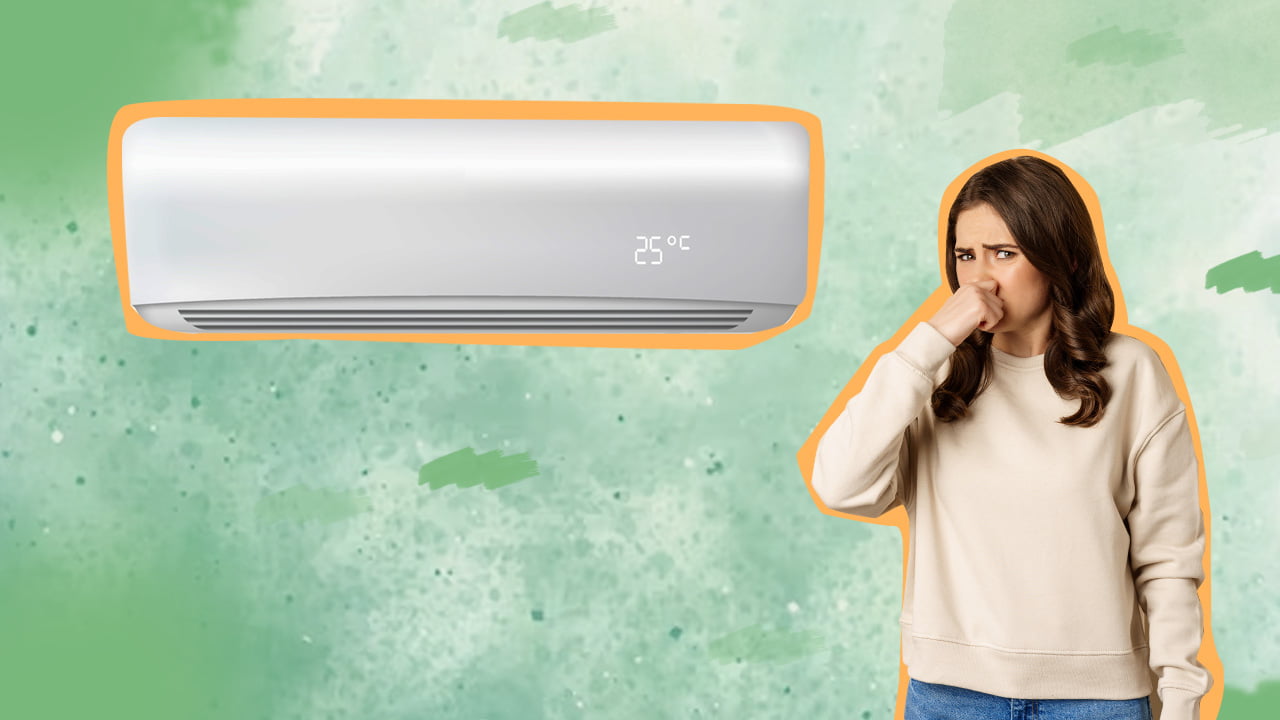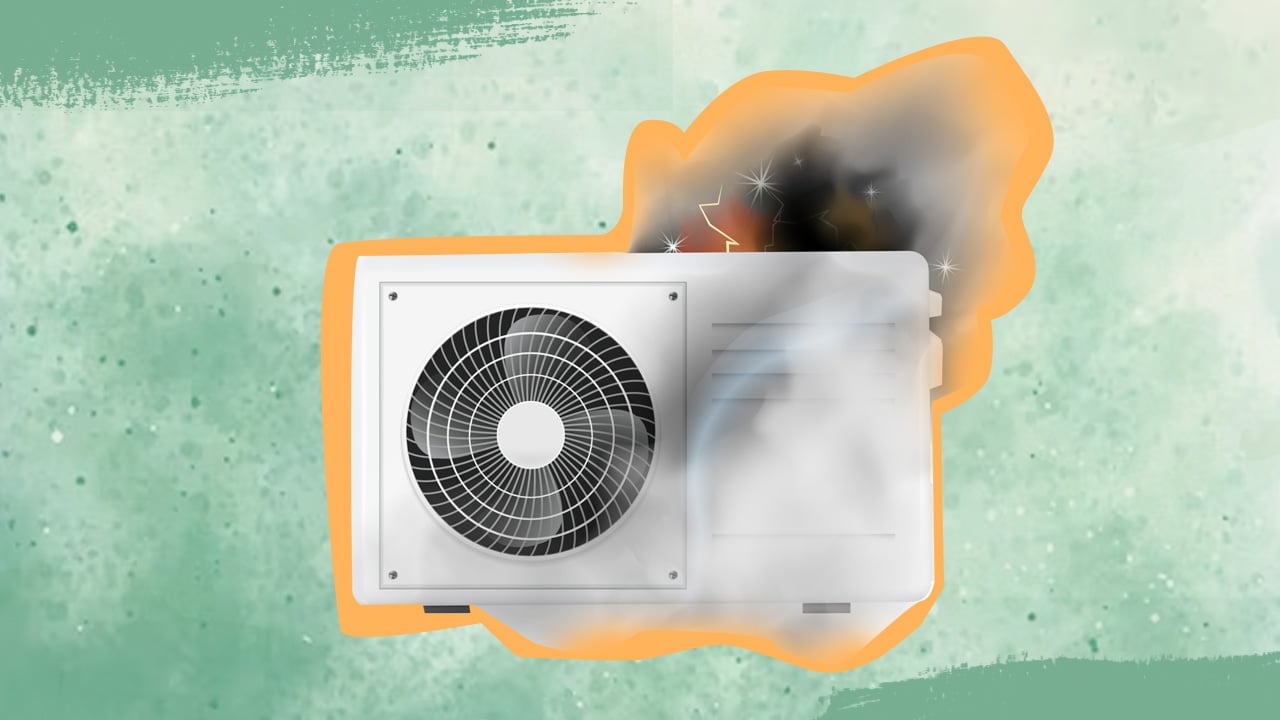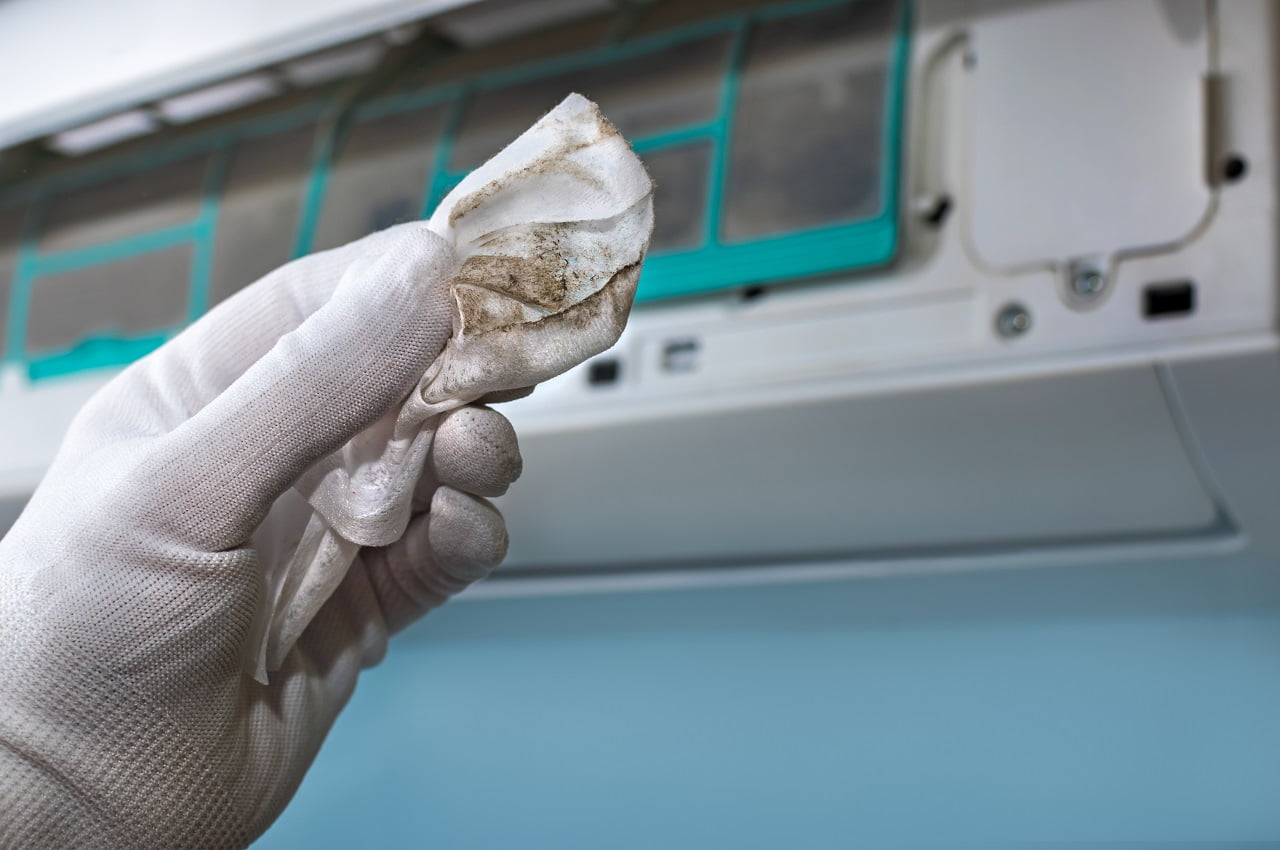A musty smell from your air conditioner can be due to dirt, and a DIY cleaning session can usually fix it. However, chemical or burning odors from your smelly air conditioner need more immediate attention and technical repair from a trusted professional.

Air conditioners aren't supposed to smell like anything. If everything is functioning correctly, they should cool, dehumidify or heat your room without any noticeable changes in what the central air conditioner smells like.
Therefore, if you notice your air conditioning system giving off an unusual odor before reaching the end of its lifespan, it's always a sign of a problem that needs addressing.
There are different kinds of central air conditioner smells, which arise from various internal and external issues. So, don't just spray room freshener and hope for the best. You should permanently and safely fix the problem.
Thus, let's explore why your air conditioner smells bad and how to eliminate the odor, but do note preventive maintenance will help you in the future.
Why Air Conditioning Smells Bad And Their Causes

1. The Smell Of Rotten Eggs
Description
Your air conditioner smells bad and revolting, making you feel nauseated and have a headache if you breathe in it too long. If you're lucky enough to be unfamiliar with the smell of rotten eggs, it can also come from rotten, standing dirty water sometimes.
Chemically speaking, this smell is usually an indicator of Hydrogen Sulfide in the air. Also, energy gas manufacturers usually add some of this chemical substance to your gas supply so that the gas smell immediately alarms you about a leak.
Reason
A rotten egg odor emanating from your air conditioner can have two reasons: primarily, it can be a gas leak.
Another possibility is that a small, dead animal like a rodent, raccoon, cat, or pigeon made its way into one of your vents and died there. It's sad and disturbing to some, but you need to find where the carcass lies and get the area disinfected. Aside from being pungent, the rotten smell indicates that your home is filled with germs.
2. The Smell Of Burning Plastic
Description
Have you ever accidentally left a PET bottle or plastic spoon too close to the oven? It smells quite pungent, similar to gunpowder, and makes you cough.
The unpleasant air conditioner burning smell that emerges is similar to burning plastic. Other places you might have encountered this burning smell are rubber car tire combustion and overheated electric wires. It can also be a bit similar to tobacco smoke or stale cigarette smoke.
Reason
As you can guess, burning plastic AC smells signify nothing good for your air conditioner. Its most common cause is a fire in the air conditioning system circuits.
A printed circuit board can overheat for several reasons, ranging from overuse to unregulated voltage fluctuation. Thus, you should take immediate steps when your air conditioner smells like this.
First, use a plastic or wooden object to switch off your AC - do not touch any part of it with your naked hands or a metallic object. Then, you should contact an electrician and check your other appliances for similar smells.
3. Body Odor
Description
At first, you think you're the problem, and taking a shower will remove the unpleasant odor from your room. However, you soon realize that the indoor air quality is ruined by a sweaty air conditioner smell whenever you turn on your AC, regardless of who's in the area.
This is the most common answer to “Why does my air conditioner smell bad?” But it’s the most difficult to spot, especially when it's mild.
So, instead of ignoring a consistent stench of sweat in your room, determine if it's coming from your air conditioner. The best method is to leave it running in an empty, disinfected, and closed room for about 20 minutes. If the air conditioner smells like sweat after this, you know it's not you.
Reason
The odor from smelly socks and sweat doesn't stem from the body itself. Instead, they're gasses released by the germs that thrive in the moisture. Therefore, these same germs can infest your AC interiors, and the air conditioner smells terrible.
As you can see, this smell signifies a clogged-up air conditioner, and you should check the appliance to find the affected areas and clean them.
4. Sweet Chemical Smell
Description
This bad smell seems unnatural but not as unpleasant as the others. At worst, your air conditioner smells like paint or glue. Therefore, this makes it more dangerous because you're more likely to ignore a severe situation.
This can be the result of a refrigerant leak. This refrigerant gas usually helps your air conditioner lower your room temperature. However, the coils and chambers storing the coolant fluid sometimes corrode, leading to a leak.
Refrigerants are not meant to be inhaled and might even be a fire hazard. Additionally, depending on your air conditioner's age, it can cause significant damage to the environment. ACs manufactured before the Montreal Protocol use R-22 chlorofluorocarbon refrigerant, and a sizable leak can seriously affect the ozone layer and contribute to global warming. It also makes your AC stop cooling your room.
Reason
Corrosion creates cracks in the copper coil, but it's not the only way a leak can happen.
Air has rare formic particles that create pinholes in metal when they touch it. If your air conditioner encounters one of these particles, even a tiny hole will be enough space for the high-pressure coolant to hiss out.
Another reason behind refrigerant leaks is the condenser movements. These chambers rotate rapidly to cool the air, and they can create heavy vibrations in the surrounding parts. It can cause physical damage to the refrigerant coil.
5. Strong Vinegar Smell
Description
Vinegar smells strong, pungent, and sour. If you get this kind of AC smell, it leads to poor indoor air quality and makes the room almost impossible to inhabit.
Acidic organic compounds are released when bacteria respond anaerobically, i.e., without oxygen. Thus, it's unlikely that your air conditioner reeks of actual vinegar, but similar compounds can make you think of the smell.
Reason
Anaerobic bacteria thrive in suffocating, moist, and dirty areas. A buildup of debris and grime on your air filter will invite germs to proliferate and fill your room with pungent gasses.
Another cause of this smell is condensation. Have you ever noticed little droplets on your window if you turn your AC on too high on a humid day? This can also happen inside the air conditioner and air ducts, and it's more challenging to wipe off. As this water collects, all kinds of bacteria and fungi fester.
6. Mildew Or Ammonia Odor
Description
This is another common air conditioner smell, and it's one of the deadlier ones. Mildew has a musty smell, similar to rotting vegetables, sewage, or a skunk. However, it can also start smelling stronger, resembling a dirty public toilet.
This bad smell is similar to ammonia, and you should address this air conditioner smell immediately. Ammonia is harmful enough to your body on its own. If you're exposed to it for too long, it can cause headaches, dizziness, and suffocation.
Reason
Your air conditioner has an evaporator coil, and this area absorbs the humidity from the air when you turn on the dehumidifier settings. However, atmospheric water typically isn't pure. Tiny microbes and mold particles cling to the molecules.
But that's not all. If you have mold, mildew, or bacteria growth inside your AC, they're releasing certain substances that have an unpleasant smell, like ammonia or cat pee. These are known as mycotoxins, which are the microbes' waste materials.

How To Fix Common AC Odor Problems
Now that you know why your air conditioner smells bad, you can address the root cause. Below are the methods of solving the common issues. You can do it yourself, but serious problems require professional help.
1. Refrigerant Leak
Besides the sweet Freon smell, you can check for some other symptoms of a refrigerant leak. It will leave tiny icicles on your air conditioner pipe and dehumidifier. Also, you might hear some unexpected air conditioner noises, like pulsating or buzzing sounds. Your AC smells bad, and you’ll find water leaks. Your electricity bills might also get higher.
A refrigerator leak needs to be fixed by an experienced mechanic. It's best to call your air conditioning brand's customer helpline and explain the situation.
However, this is also an excellent opportunity to ask about the coolant type and get it replaced. If your AC still uses the old freon refrigerant, consider asking for an upgrade to a greener coolant that'll keep you safer in the future and reduce air pollution.
2. Natural Gas Leak
Exhaust gas accidents and leaks don't usually originate from the air conditioner, but they're more noticeable when the home air conditioner runs. Natural gas leaks are detrimental to your health, and people have died from exposure to it.
Your first reaction to the sulfur smell should be to gather your family members and pets and leave the house. Now, while you wait in a safer area, a plumber from your gas company or fire department will fix the leak.
This professional plumber will find the leak, clean all the pipes surrounding it, and seal it with epoxy. Your home should be safe to enter after the seal solidifies and the residual gas flows away naturally.
3. Dirt Collection
Your AC parts gathering dust is unavoidable - a simple consequence of regular use and entropy. So, cleaning it now and then keeps the most common air conditioner smells away.
Usually, the air filter gathers the most dust and is also the simplest to clean. Follow the instruction manual to take it out safely, and then brush off the excess dirt. You can hold it under running water to finish the job, but let it dry completely before putting it back in the AC.
4. Mold And Mildew Growth
Mold is more difficult to clean up than dirt because some microbes can stay behind even after you wash the air filter, and they'll just grow into a smelly colony again. If your air conditioner smells like rot, but it’s pretty mild, you can try using disinfectant when you clean your air filters.
However, if the smell persists after this or you smell ammonia, it's a more serious mildew issue that requires professional help. A technician will scrub every inch of your AC and comb your home for other places this mildew could be growing. It's necessary to eliminate the possibility of dangerous gasses and black mold.

Conclusion
Hopefully, you can identify where your air conditioning smell is coming from and DIY a solution or get it fixed with outside help. Some air conditioner smells are from problems in your HVAC system and lack of maintenance, while others stem from problems throughout your house.
Gas leaks are always dangerous. They smell like sulfur to warn you, but their real danger is the odorless carbon monoxide that suffocates you slowly without many symptoms. So, always pay attention to this problem and treat it like a fire.
However, if the source of the pungent air conditioning smells lies in your AC unit and doesn't go away after repairing it, you should be compensated by the heating and cooling company. These recurring issues are serious health hazards, and they’re abnormal. Thus, the air conditioning company should provide you with better repairs or a replacement based on your warranty.
